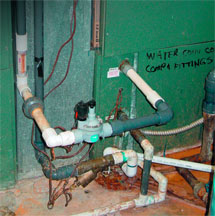
Classifying Risk
Fire up
Warming up to heating-related risks
by Linda D. Ferguson, CPCU
 |
With most of the country beginning to feel the effects of winter, staying warm becomes a priority. Furnaces, space heaters and boilers are all methods of supplying heat to the buildings in which we live and work. How do we classify these wonderful heat producers?
Let’s start with the manufacturer. If you were thinking about a space heater, you might look under Appliance and Accessories Manufacturing codes. However, each code has footnotes clarifying that heating equipment manufacturing is excluded. Therefore, these classifications cannot be used.
Since the footnotes in Appliances refer to heating equipment, that is the next stop in developing the classification for all types of heating units from boilers to furnaces to space heaters. Heating Equipment Manufacturing is divided into four different classes based on the type of fuel used to provide the heating:
Heating Equipment Manufacturing — coal or wood 55010
Heating Equipment Manufacturing — electric 55011
Heating Equipment Manufacturing — fuel oil or kerosene 55012
Heating Equipment Manufacturing — gas or liquefied petroleum gas 55013
The footnotes for each class state that if there is any installation or repair, additional classifications must be attached. In addition, if the fuel used is electric or gas, combination heating and air-conditioning sales can be included within the code. This eliminates the need to add a separate air-conditioning manufacturing class.
There are significant differences in the rates for each type of fuel used. Therefore, if an insured manufactures more than one type of heating unit, splitting the sales by types of fuels could save money. Remember this is beneficial only if the insured can substantiate the units by fuel type in its accounting. If there is no separation by sales, the highest-rated classification will prevail.
The next step in the process of obtaining heat is the distributor or dealer. There is one code for the operation that handles only sales and does not engage in any repair or installation. It is based on sales:
Heating or Combined Heating and Air-conditioning Equipment - dealers or distributors only - 13930
The next two codes are more inclusive in that they include sales, service, installation and repair under a single code. Since installation and repair are considered a major part of the code, the codes are based on payroll, not on sales. The use of liquefied petroleum gas is the only criterion used to separate the classes:
Heating or Combined Heating and Air-conditioning Systems or Equipment - dealers or distributors and installation, servicing or repair - NOC - 95648
Heating or Combined Heating and Air-conditioning Systems or Equipment dealers or distributors and installation, servicing or repair - no liquefied petroleum gas (LPG) equipment sales or work - 95647
These two codes cannot be used in combination. If there are any LPG gas units, the 95648 must be used. If there are no LPG fueled units, the 95647 must be used.
Included in these codes are any sales or display rooms, as well as the ductwork and piping that are necessary for a complete installation. When either 95648 or 95647 is used, there is no need to add 13930.
In the past, the Plumbing codes were used in conjunction with the Heating codes. This is no longer the case and the Plumbing codes 98482 and 98483 footnotes specifically state that installation, servicing and repair of any heating equipment or LPG systems or piping must be separately classified and rated.
The last item to consider is the operation that sells portable heating units in addition to other items. The possible classes include:
Department or Discount Stores - 12356
Appliance Distributors - household type - 10040
Appliance Stores - household type - 10042
Hardware Stores - 13716
Since there are no footnotes to state that portable heating units are not eligible to be included in these classifications, there is no requirement that they be separated out and rated individually. The sales can be combined with other items for sale in these stores.
Staying warm is an integral part of winter living. However, heating equipment can turn deadly if it is not installed properly or if it used unwisely. In addition, remember to use carbon monoxide detectors if you have gas, fuel oil or LPG gas furnaces or appliances. Keep electrical space heaters properly grounded; never overload outlets; and keep children away. Because accidents can and do happen, remember to change your smoke alarms batteries on a regular basis. n
The author
Linda D. Ferguson, CPCU, has 30 years of underwriting experience with national commercial lines carriers. She is vice president of Technical and Educational Products at The Rough Notes Company, Inc.